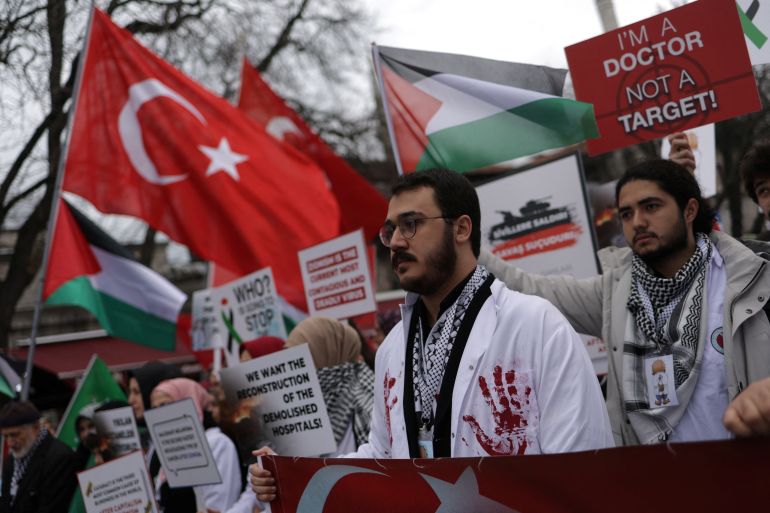Turkey restricts exports of 54 products to Israel until Gaza ceasefire
Trade Ministry says decision to remain in place until Israel stops attacks and allows adequate humanitarian aid into Gaza.

Turkey says it will impose restrictions on exports to Israel until there is a ceasefire and increased aid in the Gaza Strip after the Israeli government refused to allow it to airdrop aid over the besieged and bombarded territory.
The Turkish Ministry of Trade said on Tuesday it will no longer send to Israel items in 54 categories spanning iron and steel products, jet fuel, construction equipment, machines, cement, granites, chemicals, pesticides and bricks.
Keep reading
list of 4 itemsHamas, Israel say no progress in Gaza truce talks
Celebrations in eastern Turkey as pro-Kurdish mayor-elect reinstated
Turkey’s opposition claims victory in major cities
“Israel continues to flagrantly violate international law and ignores the international community,” it said in a statement. “This decision will remain in place until Israel declares a ceasefire immediately and allows adequate and uninterrupted flow of humanitarian aid into Gaza.”
More than 33,000 people have been killed in Israel’s six-month war on Gaza, according to Palestinian health officials, with many countries expressing outrage over the death toll and humanitarian crisis arising from the Israeli attacks and siege. Israel launched its assault in response to Hamas-led attacks on Israel on October 7, which killed 1,139 people, according to an Al Jazeera tally based on Israeli statistics.
Israeli Foreign Minister Israel Katz hit back at Turkey’s announcement saying Turkish President Recep Tayyip Erdogan is “once again sacrificing the economic interests of the people of Turkey for his support of the Hamas murderers in Gaza”.
He added Israel would take “measures that will harm the Turkish economy”, including banning some Turkish imports, asking United States-based organisations to stop investing in Turkey, and calling “our friends in the American Congress” to impose sanctions on Turkey.
The announcement of the trade curbs came a day after Turkey promised “step by step” reprisals against Israel after it blocked Turkish cargo military planes from dropping aid over Gaza.
“We will continue our support to our Palestinian brothers and sisters until the bloodshed in Gaza stops and they live in a free Palestine, with East Jerusalem as its capital, on the basis of the 1967 borders,” Erdogan said on Tuesday, adding that Turkey has sent 45,000 tons of humanitarian aid to the region.
Israel and Turkey pulled back their ambassadors from their respective capitals shortly after the start of the war.
The two countries have been in a war of words since, with Erdogan calling Israel a “terror state”, emphasising Turkish support for a two-state solution to the Israeli-Palestinian conflict, and condemning Israel’s decades-long occupation of the Palestinian territory during a hearing at the International Court of Justice.
But Ankara had not imposed any actual measures against Israel until Tuesday, with trades falling since October 7 but experts increasing each month this year so far, according to data published by the Turkish Exporters Assembly.
The Turkish government has faced domestic criticism over its commercial ties to Israel during the war, something that was seen by many as a factor contributing to a major defeat in local elections at the end of March.
“Unfortunately, even on an issue like the Gaza crisis, for which we did everything we could and paid the price, we failed to fend off political attacks and convince some people,” Erdogan was quoted as saying by local media after the polls.
Israel’s Army Radio on Tuesday quoted Ron Tomer, president of the Manufacturers’ Association of Israel, as saying that about 50 percent of cement, steel and marble imports of Israel are from Turkey, which he added is in the process of “taking over” other areas, including Israel’s construction industries as well.
“Maybe now the government will wake up and break away from Turkish dependence,” he said.